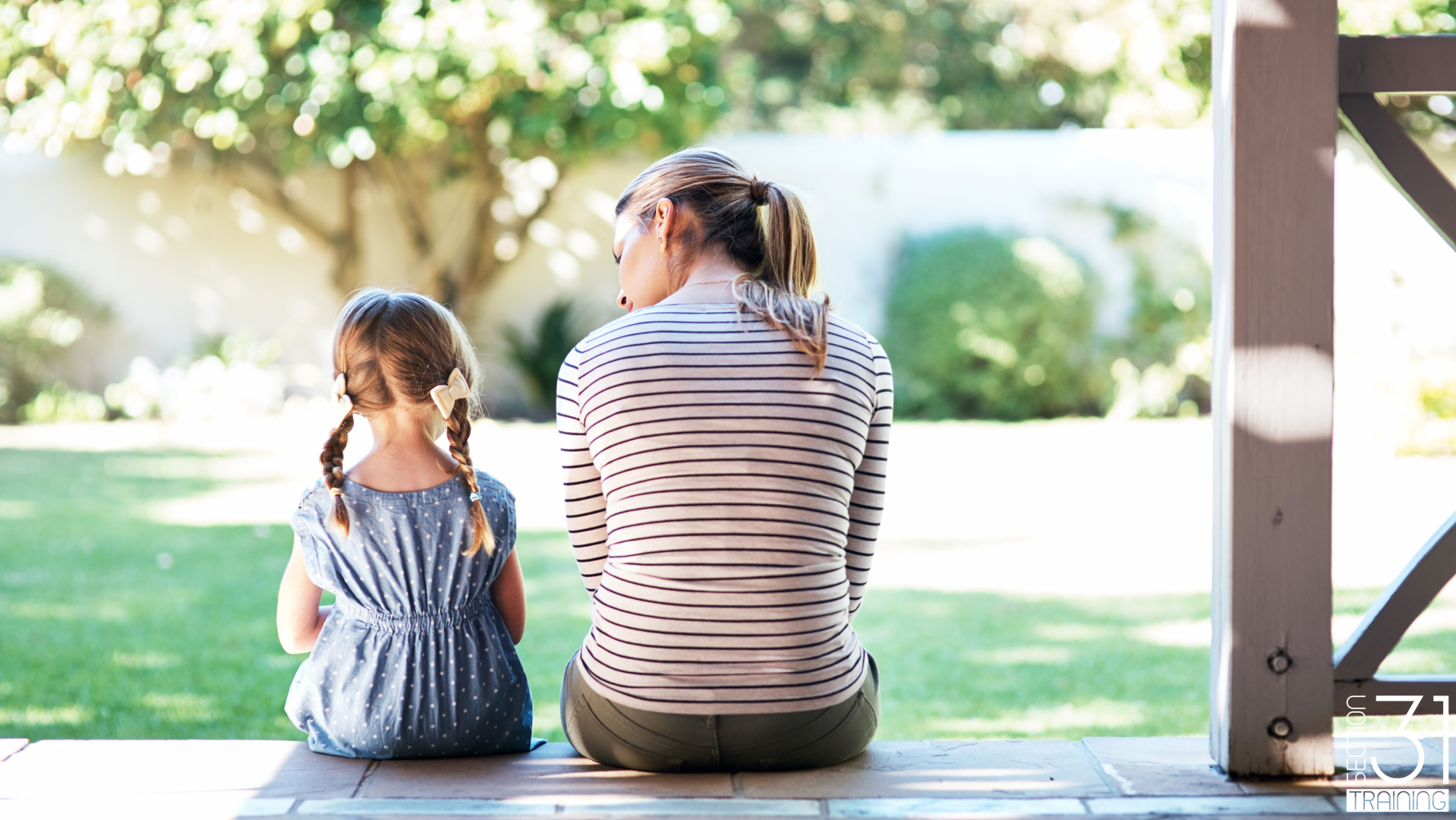
Most everyday people are familiar with the concept of foster care. Its simple right? Kids who are treated badly by their parents get taken away from those horrible environments and foster carers give them a better life. Foster carers get to make a real difference to these kids lives, they get to give them safety and take all of that pain and suffering out of children’s lives. What is not to like about being a foster carer? Why not foster?
Well… as I am about to explain, fostering is so much more than that and kids in foster care need so much more than just a room and a loving adult. Even those who have raised their own children and whom have evidently done a great job of that find fostering a completely different parenting experience to what they have become accustomed to with their own biological children. Fostering is a complicated arrangement that is hard for outsiders to understand. It is not as simple as taking them into your home and playing happy families.
Traumatised children will give you smiles, lifelong memories, a new insight and many joyous moments, fostering can be very rewarding but equally fostering can be tough. Fostered children will nearly always test you at some point, they will try to push you away, they will offload their feelings onto you and many will express behaviours that you will no doubt find challenging. You have to be willing to deal with the ups and the downs.
These kids are not to be branded as naughty though, all they are really ever doing is protecting themselves from a world they have learned to be unsafe and uncertain. Many of these kids have been let down repeatedly, abused and emotionally battered. The behaviours foster carers witness are an expression of a child’s story. These children speak the language of trauma and in the language of trauma “fuck off” can mean “I love you” and “I hate you” can mean “I like you and I am scared to love you”. If you are someone who cannot look beyond surface behaviours or who thinks that trauma can be disciplined away, if you are hurt by swear words and personal comments then simply don’t apply. These children need people who see the child beneath that shell, people who are able to understand that how children feel and how children behave are two completely different things. Above all else, children in care need people who understand, or at least, show they are trying to.
Fostering is not just about looking after kids for a bit, it is not glorified babysitting, for the most part, it is therapeutic childcare and it takes a certain type of person to be able to do it. Not everyone who wants to foster can foster but equally there are many people who believe they can’t foster but actually, they can.
Foster carers work with some of the most vulnerable members of society. Children in care have often suffered traumatic events which have led to them being placed in care and many of them lack the family support networks that others may take for granted. The entire purpose of the care system is ultimately to safeguard and protect children. And with that principle underpinning everything, safeguarding comes above all else. This means there is a lot of red tape, rules and regulations that everybody working in the system must abide by and follow. Working in the system can be very frustrating and many foster carers say that working with the kids is the easy bit, it is dealing with the system that causes them the most stress.
For those who have never had any involvement with children services or the fostering system it can be hugely confusing to understand its complexities. There are many people who are scared off by these confusing complexities. There is likely to be thousands of people around the UK who could be incredible foster carers but never apply because of how confusing and complicated fostering seems or because of how “perfect” they think they need to be. There are also many myths surrounding foster care that are untrue and put people off applying.
There are many types of fostering that require differing levels of commitment and understanding. Although some children only need somewhere safe to stay for a day, a night or even a few weeks, the majority of kids in this system are in care for the long haul, they cannot return back to their birth family, adoption is not an option and they need people who will stand by them throughout their difficult and emotional journey right to the end. Many kids are drifting in this system, they need somebody to give them stable ground.
Fostering can be the worst thing you’ve ever done or the best thing you’ve ever done, it all comes down to how you process the experience. It is what you want to make it.

You don't have to be perfect
Although children in foster care need a certain type of person, that person does not have to be perfect. Being a great foster carer is not about being perfect in anyway but if you are going to apply to foster you do need to be open minded, understanding, keen to learn and have buckets and buckets of patience. You must be adaptable and not set in your ways.
There are a lot of myths out there saying you can’t foster if you are this or that but foster carers are as diverse as the children they care for. I’ve heard people say you can’t foster if you are gay, vegan or religious and I have heard people say you need a huge house to even be considered. There are also a lot of people who have had a tough upbringing themselves or who have had some physical or mental health problems in their past who feel that this will prevent them being approved. Many of these myths come from from poor communication during assessments whereby the reasons for not approving someone have not been explained properly.
Your history, sexual orientation and belief systems alone will never be a reason not to approve you. They become a problem when you show an inability to accept or understand others outside of your own values and beliefs. For example, if you are a vegan that is not an issue within itself. You are free to eat what you want and believe in what you want. Consuming animal products is certainly not on the list of requirements to become a foster carer. However if you are unwilling to accept children who consume meat or look down on children and their families for doing so then this will be seen as an issue.
If you are religious, again you are free to live your life by the values you believe in however you cannot enforce what you believe in onto the children you care for or shun them because they believe in something different. I have a great personal example of this.
I lived with a Christian family for 2 years, the dad was a clergyman. I didn’t believe in God and I had never been to church before. Every week this family went to church and us kids had to go to Sunday school. They told me why they did what they did and why they felt certain things were important to them but they fully accepted that I didn’t believe in the same things, they never forced it upon me, there were even times where I insulted their beliefs and shouted “God isn’t real” at them. They never took that personally and fully embraced who I was, they always looked beyond the angry words. They always prayed before meals but told me I didn’t have to if I didn’t want to, they never expressed strong inexorable opinions on what was right or wrong in their religion.
These were actually some of the best foster carers I ever had. They let their beliefs guide them, they let me know why they believed in what they did but ultimately they respected my differing beliefs and respected that it was my choice to believe or not to. They supported me on my own journey and I was never shunned for being a non-believer.
On the flipside I have sat on fostering panels where religious applicants have felt being gay was wrong and “a sin” and I have witnessed one applicant who felt that certain behaviours were the work of the devil, these views are not compatible with the fostering task. Foster carers must demonstrate that they can accept a child for who they are, nurture their self-esteem and promote their identity.
It is not what you believe in that is a problem it is about how accepting you are able to be of those who may not wish to follow your “norm”. Guiding someone with positive values is very different then forcing someone to be what you think they should be.
The same applies to mental health and historical traumas. You do not have to have had a perfect childhood / history yourself to foster, in fact foster carers who have experience personal hardship themselves often have high emotional intelligence and an innate ability to understand others feelings. Adverse experiences can be a huge positive and can help people to relate to and understand children who are going through similar hardships. However those who have experienced such hardships need to demonstrate that they have overcome these issues and show that they are able to manage them now. You can have your own historic difficulties but you need to be able to separate those from the children you work with, you need to show you are not in this for your own therapeutic gain or to get your own needs met and providers will want to know how likely it would be for fostering to trigger past traumas.
Same sex couples will be assessed in the same way as any other couple and you will not be penalised based on your sexual orientation.
Ultimately, be who you want to be, believe in what you want to, but these things cannot get in the way of the role or impact a child negatively. Prospective foster carers must realise and understand that these children come from a diverse range of backgrounds and carers must be willing to adapt to and accept whatever a child may bring into their home. When you foster a child you take on their history too, you cannot just delete there past and expect them to change how they see the world overnight.
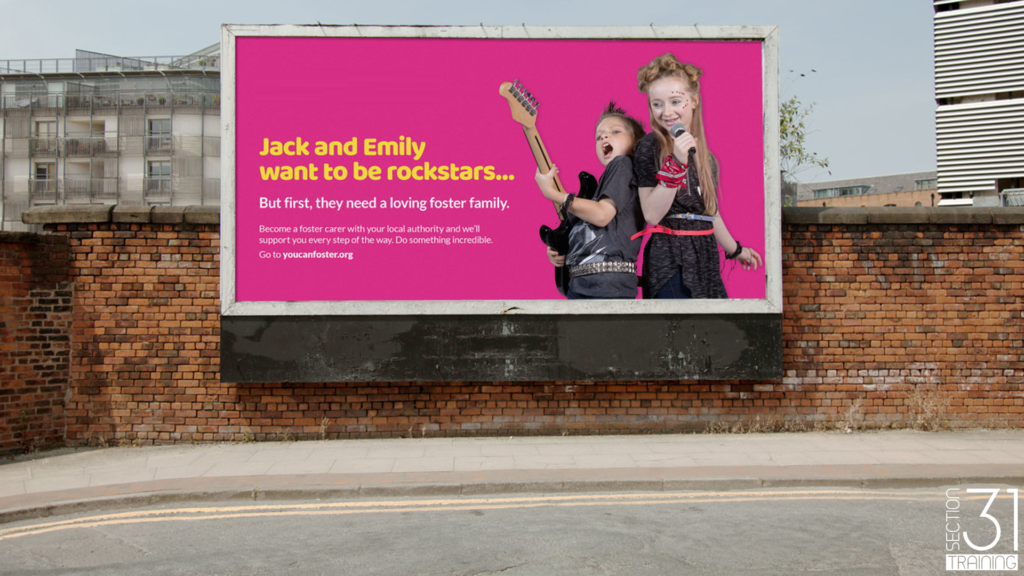
Recruitment
You have probably seen a fostering advert at some point, even if you haven’t been looking for one. They are on buses, on the radio and of course strewn all over social media.
The recruitment of foster carers is very different to any other job opening mostly because there isn’t one opening and their isn’t an application deadline. Foster Carer recruitment is an ongoing process and many fostering providers have dedicated teams of people who spend all day every day trying to recruit as many foster carers as possible.
Foster carers will always be needed and I don’t think we will ever reach a point where we have too many. The fact is, more and more children each year are finding themselves in need of foster care and for years now the system has struggled as the need has continued to outweigh the supply. According to the latest statistics there are over 80,000 looked after children within the care system and that number continues to rise each year.
Children’s charity and fostering provider Barnardo’s say that the number of children needing foster care has risen by an incredible 44% during the coronavirus pandemic while the number of people looking to become foster parents has plummeted by nearly half compared to pre-pandemic 2019. The system is desperate for foster carers, more so now than ever before and as a result fostering providers are pushing hard to recruit.
Although I fully understand why fostering providers must constantly advertise and promote fostering, as an ex-looked after child it really bothers me how the majority of fostering providers go about doing so. I will not be name dropping here and this isn’t about pointing fingers but I just feel that although there is no ill-intent, the way in which fostering is currently advertised and promoted can be very misleading with the focus being on pay and and on how fostering can make a person some kind of superhero.
I remember sitting in a car when I was a kid, I think I was about 12 years old, the radio was on. An advert came on that said “If you have a spare room and want to make a difference, call us now!”. It went on to say “with great rates of pay and great support”.
I remember hearing that and feeling quite upset. Prior to that I actually didn’t really think about money and what my carers got paid. I had no idea about money or what things cost. At that age I thought £30 was ALOT of money, so when that advert mentioned the weekly pay I felt that foster carers were getting rich from me. That advert never left me and from that point on I felt like foster carers only had me in their home because they were paid to, I felt that people were profiting off of my situation. I felt bought and I felt sold. I felt like a commodity.
I remember many occasions where I would shout at carers “you are only paid to care!” or I would demand things to be bought for me because, as I said, I thought they were loaded.
As a foster child I too could see the adverts you see on buses and in the media. It is rare to see adverts that mention what children have endured, how difficult life in foster care can be and the behavioural expressions that stem from such deep rooted psychological scars.
However, it is very difficult to advertise fostering because if they are too honest and blunt they probably wouldn’t recruit anyone. I mean, imagine an advert that says “do you want to absorb the trauma of children every day of your life?”. Would you apply?
If providers are too brutally honest nobody would come forward but if they just promote it as offering a bedroom and being paid for it then people people will either be rejected during the initial assessment or become approved and not be able to cope when a child shows the slightest sign of trauma. I understand the predicament, however I feel it is important to prepare prospective foster carers appropriately. After all, there is no point recruiting thousands of carers whilst an equal number of carers are walking out the door soon after being approved. I am not saying that fostering is all bad or that all foster children are badly behaved I just think it is important for new carers to understand that although there will be good days there will be bad ones too and people need to understand why children who have suffered trauma behave as they do. If you understand and manage these moments when they arise they can often be easily diffused and overcome. Without understanding the small things can become big things and there is a higher chance of that child experiencing another move. After having 36 moves in care myself I want to do what I can to reduce the number of moves kids have and many of these moves stem from lack of understanding and a breakdown of communication.
So yeah, you do get paid to foster, yes you do need a spare room and love to give but this is just the surface. Any prospective foster carer must take the time to really think about whether fostering is for them, whether this is right time to apply and whether they are willing and able to accept that children are in care for a reason and that reason is nearly always because that child has suffered some kind of trauma and will need to be supported in overcoming those traumas. There is not a warehouse full of perfect kids begging to be fostered. Most of these kids do not want to be in foster care, their guard is up and they struggle to trust.
In order to make any life changing difference for a looked after child you must have a good relationship with them but building a relationship can be the hardest obstacle to overcome. If you want to see just how rewarding and lifechanging fostering can be for you and the children you care for you need to give it time and have patience.
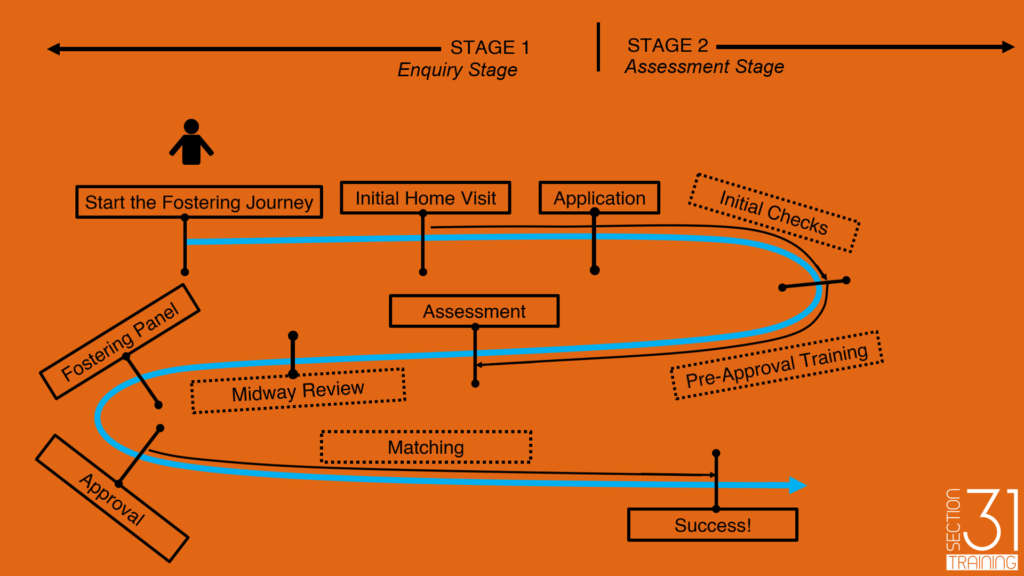
Assessment and approval
Applying to become a foster carer is pretty simple, just choose a provider and make a call. The actual assessment process is rather more complicated.
The process, in summary comprises of 6 steps which are:
Step 1: A social worker visits you at home
Step 2: Background checks
Step 3: Attend a three-day training course
Step 4: The fostering assessment
Step 5: Panel
Step 6: You’re approved to become a foster carer
The process is quite lengthy but it needs to be. Not only do providers need to assess your ability to foster, you too need to take the time to think about whether fostering is right for you and your family. The process isn’t just about assessing you, you need to also assess the situation and ask questions yourself.
The most daunting step for many prospective foster carers is the Fostering assessment (referred to as a Form F) which can feel very invasive.
The report will cover:
– your childhood, job and relationships
– your previous childcare experience
– your capacity for parenting
– your references
– any other safeguarding the provider might need to do about you or your family, such as checks with schools and the probation service
Your 3 day pre-approval training will also be a part of this assessment. It is important to be open and honest throughout this process. Remember, as I have mentioned, they are not looking for a perfect person they just need to know about you, your history and explore how this will affect your ability to foster. This isn’t just about protecting children it is about insuring you will be ok too. if you have had problems in your life which are still very raw then that will no doubt have an impact on how you process situations whilst fostering. They need to know you have dealt with these issues appropriately but also, by letting them know you struggle with something, that can also highlight areas of support.
In short, the question they are really trying to ask here is, “are you going to transfer your own problems into the children you care for?”. The bottom line is, children have suffered enough, they are carrying enough on their shoulders already, they can barely process what is happening in their own mind and their own life so they should not be in a position where they are processing your traumas and deep rooted issues too.
Although the process seems a bit over the top and invasive, as an ex-looked after child I feel this is important. Despite my chaotic journey through care I have had some absolutely incredible carers who have planted the seeds needed to enable me to become who I am today and I will be forever grateful for having those people in my life. However, I was placed with 2 abusive families early in my fostering journey.
One family in particular put my brother and I through years of torment. They presented to others as very nice people and an outsider would not know what they were like behind closed doors. These foster carers never left any physical marks on us but emotionally, they battered us. They would toy with our emotions by telling us we were just their “baggage”. Whilst living with them they would make me wet the bed by making noises outside my door at night knowing I was frightened of the dark and after wetting the bed they would rub my face in it and call me “dirty”. They took all of our memory teddies from our previous carers who we loved and threw them out the window onto an area where their dogs used to poo. They told us nobody loves us and we were made to pick the teddies back up naked. They would lock us in cupboards, restrict our diet and they made me eat soap when I sweared. They told us they would kill us if we told anyone. These are just a few of the things they did but the point is, assessments where not so invasive back then. Surface checks are not enough. I know that they would not pass a modern day Form F. Looking back it felt like it used to be a case of “collect 12 crisp packets and become a foster carer”.
I was also groomed in another home by the foster carers son who ended up sexually abusing me repeatedly over the course of a year. This is why providers also assess your family as a whole and explore your wider connections. They need to be sure that you and those around you are safe.
Although modern day fostering assessments seem over the top, please understand why and embrace the process. The assessment of carers has improved so much over the years and as a direct result of that we are seeing far less abuse in foster care than what we did 10 – 15 years ago. Some still get through but it is becoming rare.
I am not going to go into the entire process in detail here however, I have created a course called “An introduction to foster care” specifically for prospective foster carers which goes into the whole process in great detail so you know what to expect. You can access this course from the link at the bottom of this page. I have also included a jargon buster and a ton of resources within that course to help you understand the fostering world.

Why children need foster care
There is a common misconception, that all children come into care because they have bad parents. That’s not always the case. Some parents simply find themselves dealing with circumstances and situations which leads them to be unable to provide care for their children. For example, if you can imagine a typical, fully functioning family, with a Mum and a Dad, and let’s say 3 children. The Dad leaves the Mum unexpectedly, never to return, leaving the mother with depression. The psychological trauma renders her unable to look after herself, and in turn the children suffer and she neglects them. She’s not a bad person, or a bad parent. She’s just found herself in a situation where she can no longer care for herself, or her children. Situations like this could lead to children needing temporary care, whilst the parent attempts to overcome their difficulties and recover. This is just one example, but I wanted to make the point that children in care don’t just come from bad parents in rough areas. They come from all sorts of environments, and for all sorts of reasons. But essentially, children come into care because that child is either at risk of harm or is in need of care, which for whatever reason cannot be provided by their birth parents.
It’s also important to note, that coming into care is extremely traumatic for children. A common assumption is that children would feel relief when they come into care, and, yeah, sometimes they do. But coming into care is a big change for them. Often, they won’t understand why they came into care, or whether they are going back. Their whole world, and everything they know is tipped upside down overnight, and also, regardless of how they were treated by their parents, children will nearly always miss their parents, love them, and want to have their family back.
Regardless of the reasoning for them coming into care, you must understand, that with the exception of those that place themselves in care, these kids didn’t ask for this. So, they’re not just going to settle into your home, be grateful and behave. The whole process isn’t nice for them at all. For those that have taken into care due to abuse, from an outsider’s perspective, you might think that these kids have been taken away from a horrible situation, and now they’re in my lovely, safe, home, with everything they need. They are free from all that abuse now, and they should be happy. But to them, that horrible situation is what they know, it’s all they know. And although to you they are now in a better situation, it can take a long time for children to realise this.
They will be scared, confused, they will blame themselves, they will blame the system. And they will have intense feelings, which they won’t be able to understand, and they only way they’ll be able to articulate that is through their behaviour. As a foster carer, it is important you understand this and learn what these behaviours mean. Foster carers are the glue that holds the whole system and the lives of children within that system together.
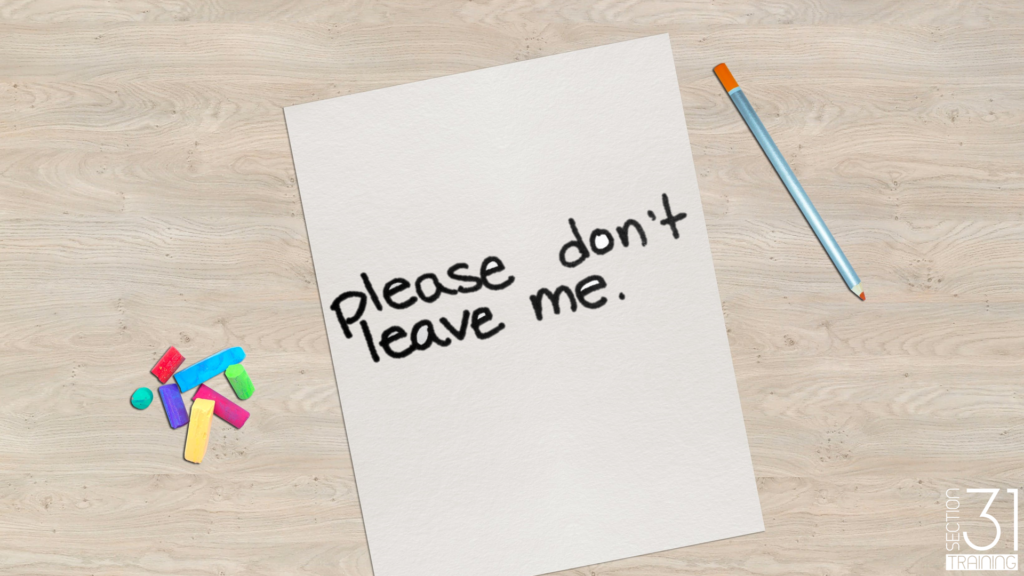
Wanting and fearing to be loved.
Above all else, children in care just want to be understood. I can tell you from my own experience of growing up in care that living with trauma is confusing and frustrating. Looking back I can see that although my behaviour was bad all I ever really wanted was to be someone’s special boy. I wanted someone to take ownership of me and love me unconditionally. Although love is what I wanted more than anything else it is also what I feared the most. I moved homes so many times, I drifted. What my life experiences taught me is that I cant help getting attached to people. No matter how hard I tried not to, I formed a connection with everyone who entered my life and I guess that makes sense. My family didn’t want me I had no parents and as a little kid I wanted to have a parent, I needed one. I was like a glue stick with no lid being carried about, if anyone made contact with me I would stick, I would become bonded with them. But I had also learned that everyone I bond to will be taken away from me, they would leave me, I would always be abandoned, that is all I had ever known.
I had also learned that feelings of abandonment lead to deep feelings of worthlessness and sadness, it hurt… a lot. To protect myself, my subconscious mind had learned that the only way to prevent the hurt and protect myself was to release anger whenever I started to like somebody.
It hurt less for me to reject someone I liked that someone I loved rejecting me and also… it gave me some sort of control over something I thought was inevitable. In thought “Your not leaving me, I’m leaving you”.
So, what foster carers would often experience is me moving in and for a number of months I was a good boy, I did everything that was asked of me. In those early days those carers meant nothing to me, the home meant nothing to me. I was in another house, there’s a woman over here and a man over there, sometimes there was a dog and one of the rooms was the one I was told I’d be staying in. As time went on that room which the carers had now helped me personalise, was my room. This house that was now becoming comfortable and familiar was my home. That dog that I had been playing with every day had become my best friend. That woman is… Mum? That man is… Dad?
I would have at that point become attached and based on my past experiences I had learned this only goes one way. I like them, then I love them, they leave and then I feel like dirt again. To protect myself my body released adrenaline and I lashed out. I became a “naughty kid” and when the carers couldn’t cope anymore I was moved on and that belief in my mind that people will always leave has again been proven to be true. Onto the next home and the cycle repeats itself.
With the exception of a few carers I never wanted to leave any of these homes really. What I really wanted is for people to prove to me they would not give up on me. I just wanted them to understand and hear what I was really trying to say which was not “I hate you and your crap house” but “you have been in my life long enough now that you mean something to me , I’m starting to like you and that will lead to love. When I love you, you will leave and I will be hurt. Please show me you are different I feel anxious and scared”
The bottom line is I would attack those who I loved the most and I wish that they could have understood that. Luckily in the end I was placed with foster carers who did understand and who stuck with me through all of that. Eventually I learned to trust them, I calmed down, I settled and those carers were able to start seeing me progress and grow.

What are the positives?
It may seem like I’m promoting fostering as a total nightmare but believe me that’s not what I’m trying to do. Fostering can be one an extremely rewarding and positive experience. Not all children have severe behavioural issues and those who do are not challenging all of the time. What I wanted to try and put across is that these kids do carry trauma and inevitably there are times where they really struggle. Children in care know they are different, the circumstances of their birth have led them down a road which is deeply confusing, stressful and frightening. They are reminded every day of what they do not have. Nobody has to tell them what they are missing in their life, it is all around them. When you are a kid in care all you have to do is leave the house to see reminders of what you have lost. You go to the park and see parents playing with their children. At Christmas, on mothers day, and fathers day adverts are all over the place making you feel alone in your situation. Being in care is tough even when you are with great carers. The emotions that stem from past memories and traumas can be very hard to process manage and contain and sometimes they just burst out. Children in care need people to understand this and be there for them when it happens. You cannot discipline away trauma, and many of these kids have very low-self esteem which can be exacerbated by those around them who constantly focus on what they have done wrong.
As I said, sometimes children just need a stepping stone whilst they wait to be reunited with their family or to be placed for adoption. Sometimes they just need a safe place to stay for a short period of time. However those on full care orders need long term carers who stick by them, fight for them and look beyond the bad behaviours and the outbursts.
I was not always nice to foster carers, in fact sometimes I said and did some awful things but for those who stuck by me I will be forever grateful. Above all else I had people in my life that taught me to like myself and that was the best gift I was ever given. Foster carers put so much pressure on themselves to “cure” kids of all that pain they carry and many feel they have failed in that quest. I always say to foster carers that the best way to look at this is, if a child is with you for one week or 10 years, if they leave your care liking themselves you have done a good job. Build everything you do around that.
Because of those who stuck by me, because of those who taught me I’m worth something I am now free from the system. My family, just like many of the families of children in this system come from generations of abuse cycles. It wasn’t just my mum, her parents abused her, my grandparents parents abused them, it goes back a long way. Our family has been know to this system for decades.
My brother and I are the first generation in our family who have broken free of systems and system dependency. We are free from abuse cycles and chaos and our children will also be free from that. We have broken free thanks to the support of a select few foster carers who understood us and who loved us at our best and our worst. The impact of what they have done will last way beyond their fostering journey, way beyond their lifespan.
Fostering can be very challenging but also, very rewarding. You have to take the good with the bad. The circumstances of a child’s birth does not need to determine their future. These kids can recover, they can heal, and the skills they have learned to survive their experiences can lead them to become very successful adults. They may be vulnerable but they are equally as strong, they have survived so much and they need to be credited for that. Fostering isn’t about turning bad kids good, it is about teaching children that the word is a safe place and that they are worthy of love, care and success. It is a long road to recovery but please, look at me, they CAN recover as I did but without foster carers they are alone with all of this, there is little hope.
I run my own business, I am in stable accommodation, I am in a stable relationship, I am honestly happy and content with the life I have. I can recognise my past but no longer feel a victim of it, I have broken free not just from systems but from victim culture. Although I know I must credit myself for what I have achieved, the proud oak you see in me was planted by foster carers who gave me everything whilst expecting very little in return. Although I told many of them to fuck off when I was a kid, I have since thanked them for what they have done for me and for my family.
There are thousands of children waiting for foster carers to give them a concrete footing. Stability and consistency is the key to recovery, not a spare room and a happy face.

Expand your understanding
I think that the best thing any new or existing foster carer can do is expand their understanding of how life is for children in care. I offer a number of care experienced courses online and in-person but even if you have completed all of those I recommend that you always look for real life stories and experiences and voices from those who have live and are still living this.
Even with my experience of living this system I am always looking for other narratives to expand my own understanding. I came across a video called “Removed” some time ago. This video is an American video and although the US care system is so very different to our system in the UK I found this video every relatable. This video encompasses how I and many children in this system feel.
Credit: Nathanael Matanick
More information
I haven’t covered everything in this post, In fact I’ve barely scratched the surface. However the course below explores the subject of becoming and being a foster carer in great detail. Downloadable resources are available throughout the course.
Also long standing foster carer Phil Watson has a very enlightening and ongoing blog covering his experiences of becoming and being a foster carer. Check out his blog below.

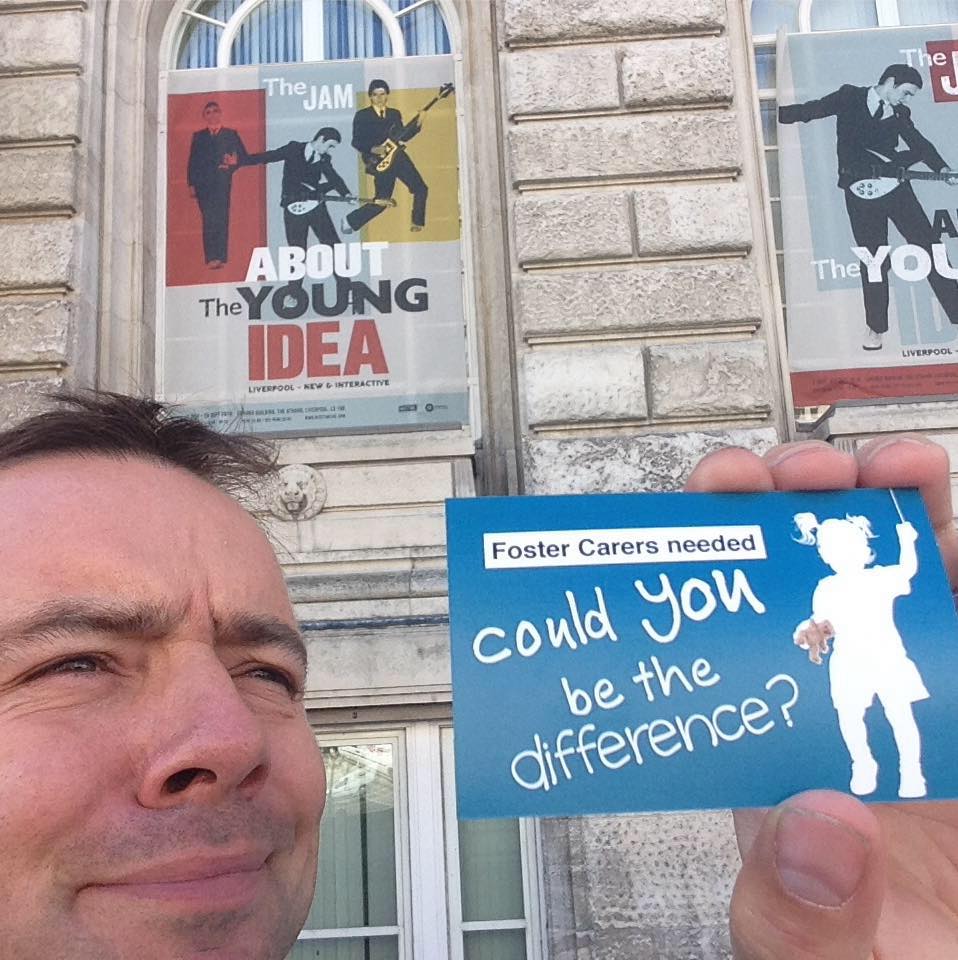



Beautiful read. I also am an ex LAC and myself now a foster parent. Everyone wanting to become a foster parent should be made to read your piece.
Thankyou Kara
I’m sure with your experience will make you an amazing foster carer . Have a read of my other posts too, I originally set out to write one a week but with my ADHD it’s more like one a month 😂
https://section31training.co.uk/category/blog/